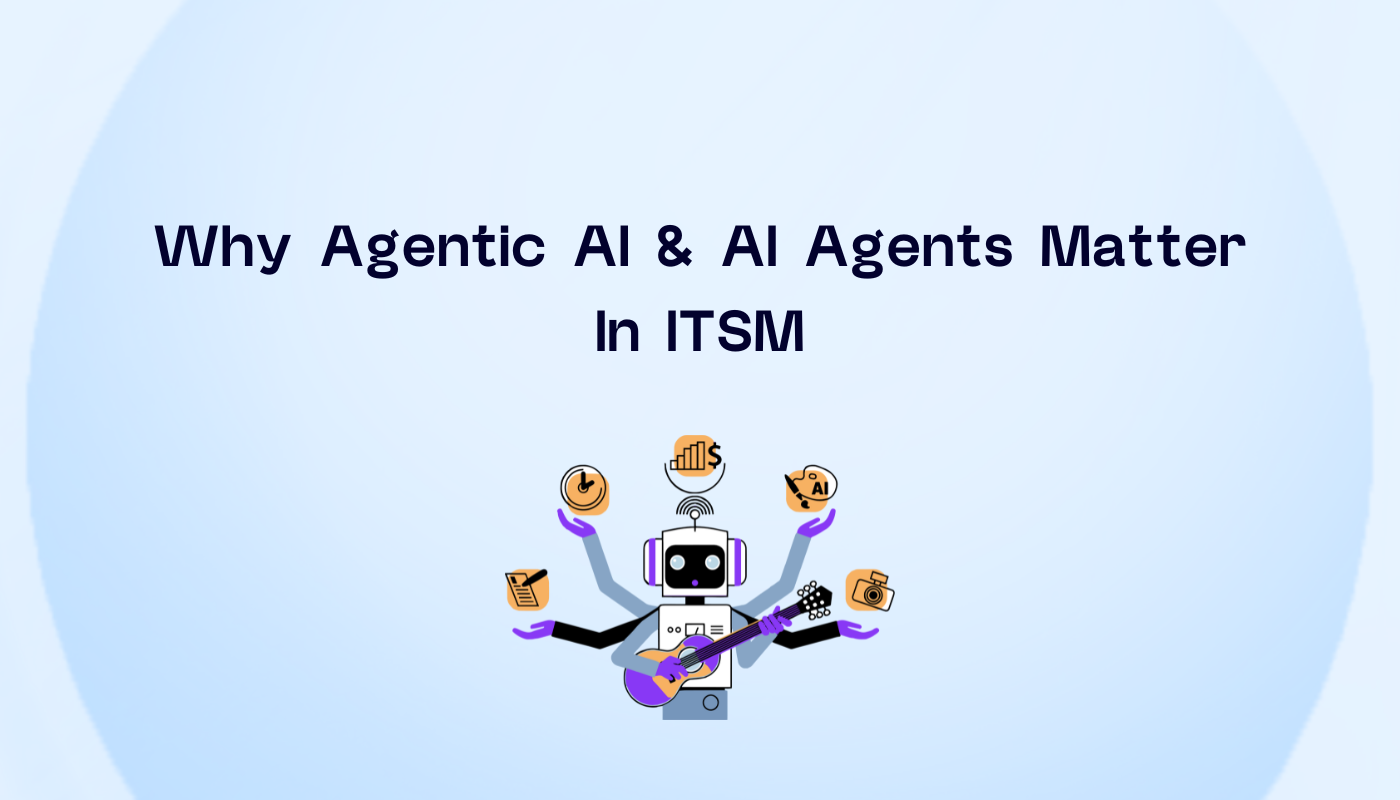What Is Agentic AI in ITSM
Category


Category
AI agents in ITSM are autonomous software components that detect, triage, and resolve incidents without needing direct human input. These agents use machine learning, pattern recognition, and system context to make decisions and act in real time.
Agentic AI in ITSM takes this a step further. Instead of following fixed workflows, it responds dynamically based on changing data, behavior patterns, and business goals. It helps IT teams move from static ticket handling to predictive and autonomous service delivery.
Compared to traditional automation, agentic AI agents work across systems without needing pre-defined scripts for each scenario. They adapt as environments change, learn from outcomes, and reduce manual overhead. That means faster resolutions, fewer escalations, and a better experience for both IT teams and end users.
The ServiceNow acquisition of Moveworks highlights the direction the industry is taking. Platforms that combine intelligence, adaptability, and automation are becoming core to enterprise service management. Servicely applies this same thinking with agentic AI to help customers simplify service delivery across IT operations.
Virtual agents respond to requests 24/7 using natural language. They handle common needs like password resets, access requests, and software installs without creating tickets or requiring agent input.
AI agents monitor systems and resolve issues the moment they’re detected. They take action based on real-time data and historical patterns, reducing MTTR and avoiding downstream impact.
Agents analyze system behavior to detect early warning signs. They send alerts, apply fixes, or open problem records before users even notice an issue. This helps reduce service disruptions.
AI tracks recurring incidents across devices, users, and systems. When patterns emerge, it identifies root causes, creates problem records, and suggests permanent fixes.
Instead of relying on static flows, agents make decisions as the environment changes. Actions are triggered by current data and context, ensuring workflows remain effective as conditions shift.
AI helps service desk teams by summarizing tickets, recommending solutions, and assisting with triage. During resolution, it guides agents on next steps using past resolution data and real-time analysis.
The platform creates articles based on successful resolutions. It updates the knowledge base automatically so that users and support staff always access current, verified information.
AI agents integrate with endpoint tools like Intune, JAMF, and Nexthink. They apply patches, enforce security policies, and monitor device health without requiring IT to intervene manually.
Agents assess the risk of proposed changes using data from past incidents and configurations. They suggest timing, alert relevant teams, and automate changes that meet low-risk criteria.
Servicely allows for multi-agent orchestration, enabling service teams to create specialised AI agents who handle a distinct set of tasks. Tasks are triaged or assigned from one AI agent to another where they need specialist input from another agent. This is carried out without any human intervention.
Specialised AI agents can be created through conversational interaction with Servicely’s AI Agent Creator assistant, allowing service teams to scale their AI workforce with low-code/no-code AI agent configuration.
Agentic AI in service management follows a continuous model to detect, analyze, act, and improve.
Agents scan inputs from logs, endpoint tools, ticket systems, and sensors. They detect issues, usage spikes, unusual patterns, and device behavior that may signal risk.
Using pattern matching and machine learning, agents determine if the issue relates to known problems or system changes. They compare against previous resolutions and escalate only when needed.
Based on predefined rules and adaptive logic, the system applies fixes, assigns tickets, or triggers change requests. If human input is needed, the agent provides full context to the support team.
Each outcome feeds back into the model. The agent learns which actions work, what failed, and how to improve classification, resolution speed, and triage accuracy.
Successful resolutions become knowledge entries. These articles support future requests and feed both self-service portals and agent tools.
Our agentic AI platform is designed for real operational environments. It supports multi-channel input, enterprise tools, and existing service workflows. Customers see benefits within weeks, not months.
You don’t need in-house AI experts. Our team supports implementation, and our platform includes built-in models, pre-trained workflows, and low-code setup tools.
It integrates with core systems like Intune, JAMF, Active Directory, and more. Whether you're automating simple IT requests or building predictive service strategies, our AI agents make it possible.
See our Servicely blog for real examples of how agentic AI is being used today.
